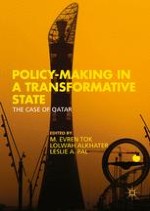2016 | OriginalPaper | Buchkapitel
14. Conclusions
verfasst von : Lolwah R. M. Alkhater, M. Evren Tok, Leslie A. Pal
Erschienen in: Policy-Making in a Transformative State
Verlag: Palgrave Macmillan UK
Aktivieren Sie unsere intelligente Suche, um passende Fachinhalte oder Patente zu finden.
Wählen Sie Textabschnitte aus um mit Künstlicher Intelligenz passenden Patente zu finden. powered by
Markieren Sie Textabschnitte, um KI-gestützt weitere passende Inhalte zu finden. powered by
